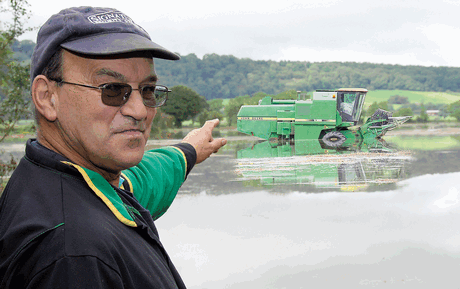Welsh harvest is ‘worst ever’

Farmers in the main cereal growing areas of Wales claim that up to five times the average summer rainfall has made the 2008 harvest the worst ever.
Records kept at the Penllyn Estate, near Cowbridge, show that 17in of rain fell in July and August and a further 5in in the first nine days of September.
John Homfray, the estate’s owner, said that with 40 acres of wheat still to combine, he had already tipped 300t of “wheat sludge” into one shed but had no drying facilities. He also said he might have to wholecrop 20 acres of flattened oats.
A few miles away at Gelli Goch, Llansannor, Peter and Mark Jarvis are still struggling to combine the last of the 80 acres of cereals they grow to feed cattle and sheep.
“We have had 7in of rain in the last week,” said Mark Jarvis.
“The last grain we managed to harvest was so wet, it was difficult to tip it out of the combine tanker, and the sample is sprouting badly.”

Edward Thomas, whose family grows about 1800 acres of cereals in the Vale of Glamorgan, said two-thirds of the harvesting was completed and the remaining crops had shed up to half their grain.
With grain coming off the combine at about 25% moisture, every load has to be dried.
Ed Rees, chairman of NFU Cymru’s livestock board, who farms at Pendoylan in Glamorgan, said feeding-quality straw would be scarce and expensive.
“I am not too concerned about grain because yields on the continent of Europe and further afield have been good, and some UK crops grown for milling will end up on the feed market,” he said.
“But I am very worried about farmers who rely on buying straw for feeding and bedding.”
With some merchants already quoting £60/t for straw, Mr Rees and others contacted by Farmers Weekly expect livestock farmers to have to search for alternative bedding materials, such as paper waste and wood chip.
John Owen, chairman of NFU-Cymru’s less favoured area board, said he was worried about delayed silage-making.
“Many upland farmers are still to take their first silage cut. Those who have, admit quality is below average. Unless we get some decent weather soon, it is going to be a disastrously expensive winter.”
Upland farmers who depend on selling store lambs could also be hit because the specialist finishers who buy them have been unable to sow fodder crops on waterlogged fields.
Wales under water
- Five times average summer rainfall
- Shortage of fodder for store lambs
- Silage stocks low
- Bedding at record prices

